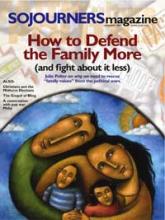East Tennessee swelters in the summer. Everywhere there are mosquitoes and sunburns and the constant clamor of air conditioning. But in a particular valley last June, a new sound joined the cacophony.
At a farm just south of Knoxville, radical sermons mingled with the sounds of avant-garde music, a “bartering barn” overflowed with the trading of folks interested in creating an alternative (cash-free) economy, and the sound of celebration—of a raucous family reunion—filled the fields.
The reunion was called PAPA Festival (People Against Poverty and Apathy), and the family consisted largely of “New Monastics,” a movement of young people gravitating toward intentional, communal living in America’s inner cities.
It is an extended family of people such as Leah Eads, of Evansville, Ind., a soft-spoken young woman who finds herself frustrated with the disconnect between the things Jesus preached and the way mainstream churches in Evansville choose to follow.
“Big, rich, white, suburban,” she says of many churches in her hometown. “[They have] the best intentions, don’t want to be greedy, but somehow [are] pretty isolated from the poor and real needs. It’s easier to give a check in the offering plate, which ultimately goes to pay the electricity and the air conditioning for the building and the huge staff, and doesn’t do a lot for the poor in your own community, much less the rest of the world.”
Leah shades her face from the pounding sun and smiles at the concept of New Monasticism being, in fact, new. “I think there’s always a pocket of this,” she says, referring to the New Monastic emphasis on unplugging from societal structures while simultaneously trying to change them. “My parents brought me up this way so I’m thrilled to see so many other people. At the same time it still feels like a very small group.”
Read the Full Article

